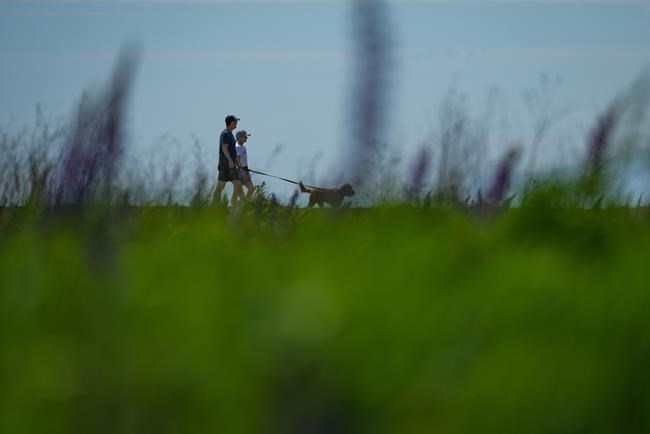
People are framed by wildflowers while walking a dog on a pathway at Garry Point Park, in Richmond, B.C., on Thursday, May 18, 2023. The B.C. government says its drug decriminalization policy has been amended to stop people from using illegal substances near playgrounds and parks.THE CANADIAN PRESS/Darryl Dyck
Republished September 14, 2023 - 5:07 PM
Original Publication Date September 14, 2023 - 1:06 PM
VANCOUVER - British Columbia Premier David Eby says new provincial legislation is in the works to regulate public consumption of hard drugs as the province continues its experiment with decriminalization of small amounts of illicit substances.
Eby says the new law relates to an amendment by the federal government to B.C.'s decriminalization policy that aims to stop people from possessing illegal substances near playgrounds and parks.
The Ministry of Mental Health and Addictions said in a statement Thursday that the federal government approved the changes that expand the areas where drug possession remains illegal.
The federal government gave the province an exemption from the law in May of last year to allow for the removal of criminal penalties for people caught with a small amount of illicit drugs for personal use.
The new changes mean illegal drug possession within 15 metres of playgrounds, waterparks and skate parks will be prohibited as of Sept. 18, although possession was already prohibited on school grounds and in childcare facilities.
The provincial government says the amendments mean police can again enforce federal drug laws if people are found with illegal drugs near "child-focused spaces."
It says intoxication remains illegal in all public places.
Eby said in Langley, B.C., that new legislation to be introduced in the upcoming legislative session "will add on and build on the announcement that Health Canada made today to ensure that there's comprehensive coverage of the areas that we know we don't want people using hard drugs, and we will take the steps necessary to ensure that communities are safe."
At the same time, Eby said, people struggling with addiction need access to treatment beds across B.C. and need to be able to come forward about their health issues without fear of being arrested.
"We've got to make sure that we're balancing these two things: safe, livable communities and ensuring that people struggling with addiction come forward and can have their mental health issues that they're struggling with not be treated as a criminal issue," he said.
Eby said the new law will allow police to arrest people for possessing drugs in areas exempted from the decriminalization policy, giving law enforcement a "tool" to tell drug users that places frequented by children aren't appropriate places to have drugs.
"I hope and expect that people, even when struggling with addiction, will understand the importance that we've all got to live in the community together, and if there's a place that's funded and safe and appropriate to use, that you should be going to that health-care site rather than to a site that's used by children," he said.
Victoria Mayor Marianne Alto said in the provincial government's statement that while decriminalization is one part of the response to the toxic drug crisis, it's important to take steps that specifically protect children.
Vancouver Mayor Ken Sim said the city had asked the provincial government to get Health Canada to make the change.
"This is a positive step forward in helping to find balance for our communities, including families, seniors, children, and our most vulnerable residents," he said in a statement issued Thursday.
Mark Haden, an adjunct professor at the University of British Columbia's School of Population and Public Health, said in an interview Thursday that the province is "tweaking" its decriminalization policy "in response to some pushback from mayors who are saying 'this isn't working particularly well for us because it's disempowering the police.'"
Haden said the province's move is not "dealing with the real problem of prohibition."
"We have a supply-chain problem that decriminalization isn't resolving," he said. "It's the supply-chain problem that's actually killing people."
Haden said the toxic drug crisis and perception of public disorder will continue because decriminalization doesn't remove those who are addicted from the criminal justice system, to instead treat them through the health care system.
He said effective, evidence-based treatment doesn't mean handing out "buckets" of drugs, but rather giving people both a safe supply and controlled environment to manage their addictions.
Political opposition to safe supply and drug decriminalization is an example of a "common political strategy," Haden said.
"Politicians succeed when they make people afraid and they offer themselves as the solution," he said. "It's very common because it works, and so politicians have to find bad guys."
"It's a strategy to get elected, it's relatively successful, and unfortunately some people choose drug users to be that bad guy," he said.
The BC Coroners Service said 198 deaths were reported in July due to toxic illicit drugs, putting the province on pace for the deadliest year since a public health emergency was first declared in April 2016.
It said there were at least 1,455 deaths in the first seven months of 2023, the most ever recorded.
This report by The Canadian Press was first published Sept. 14, 2023.
Note to readers: This is a corrected story. A previous version said the amendment was to stop people from using illegal drugs.
News from © The Canadian Press, 2023